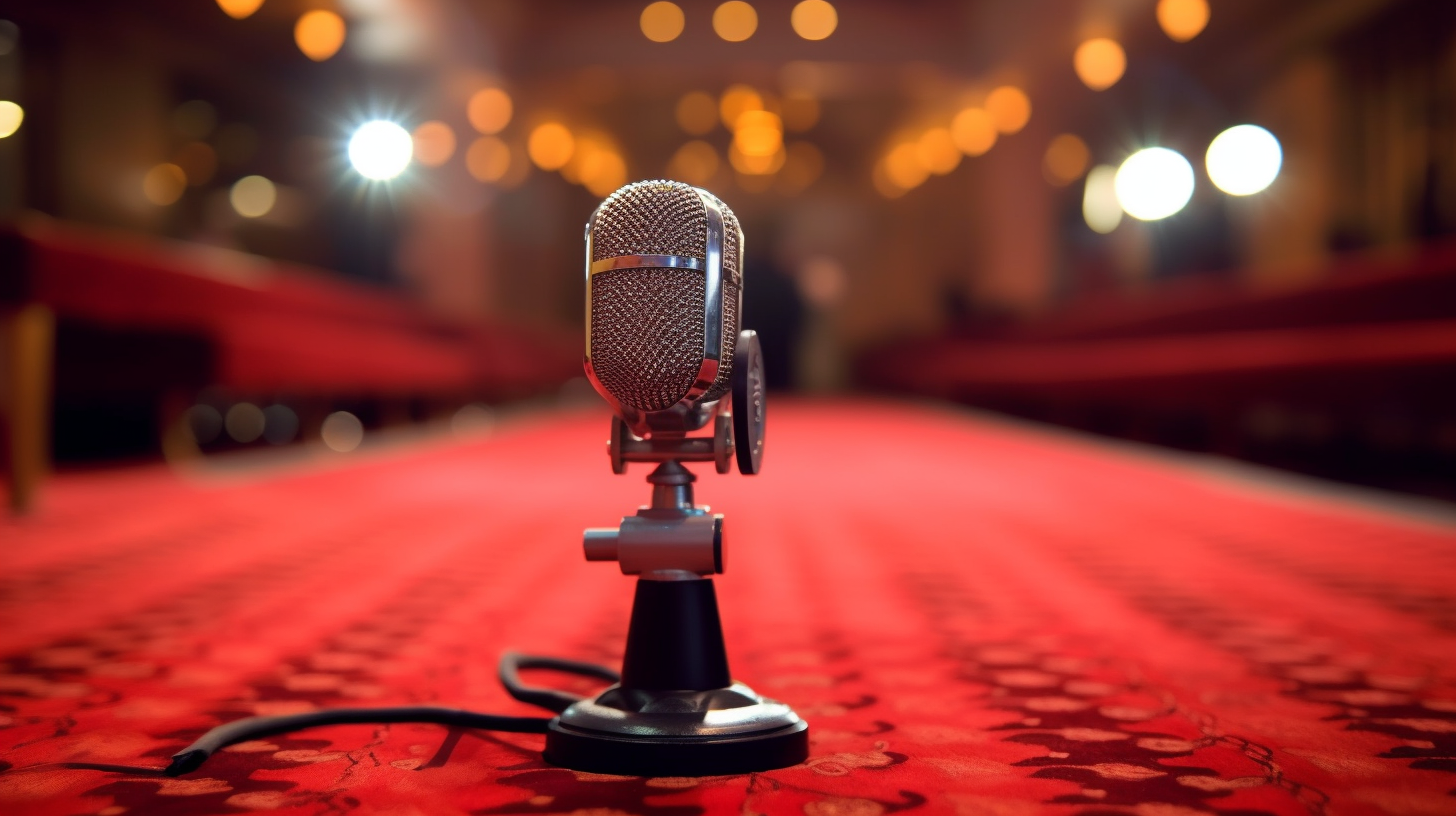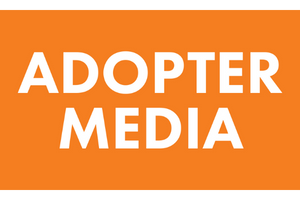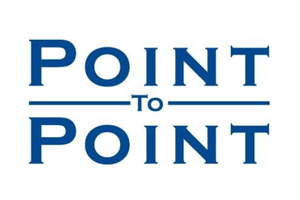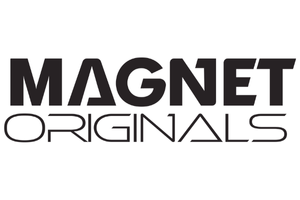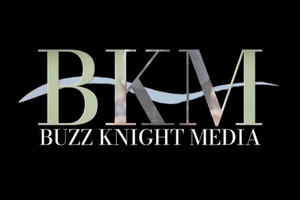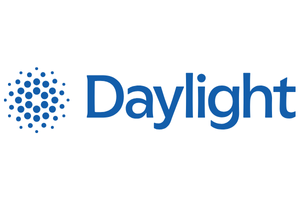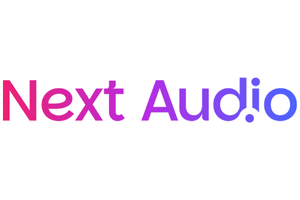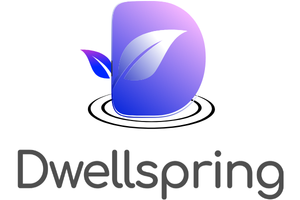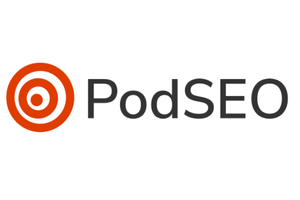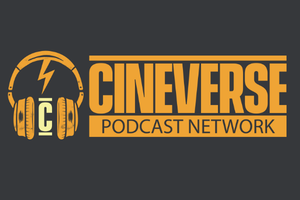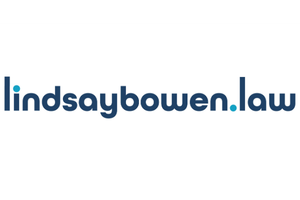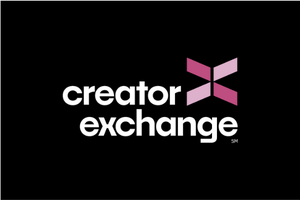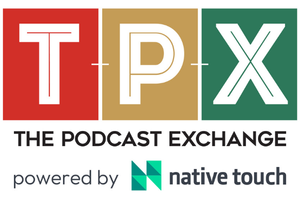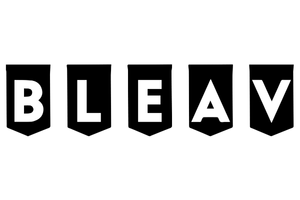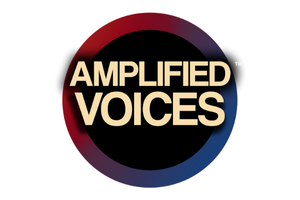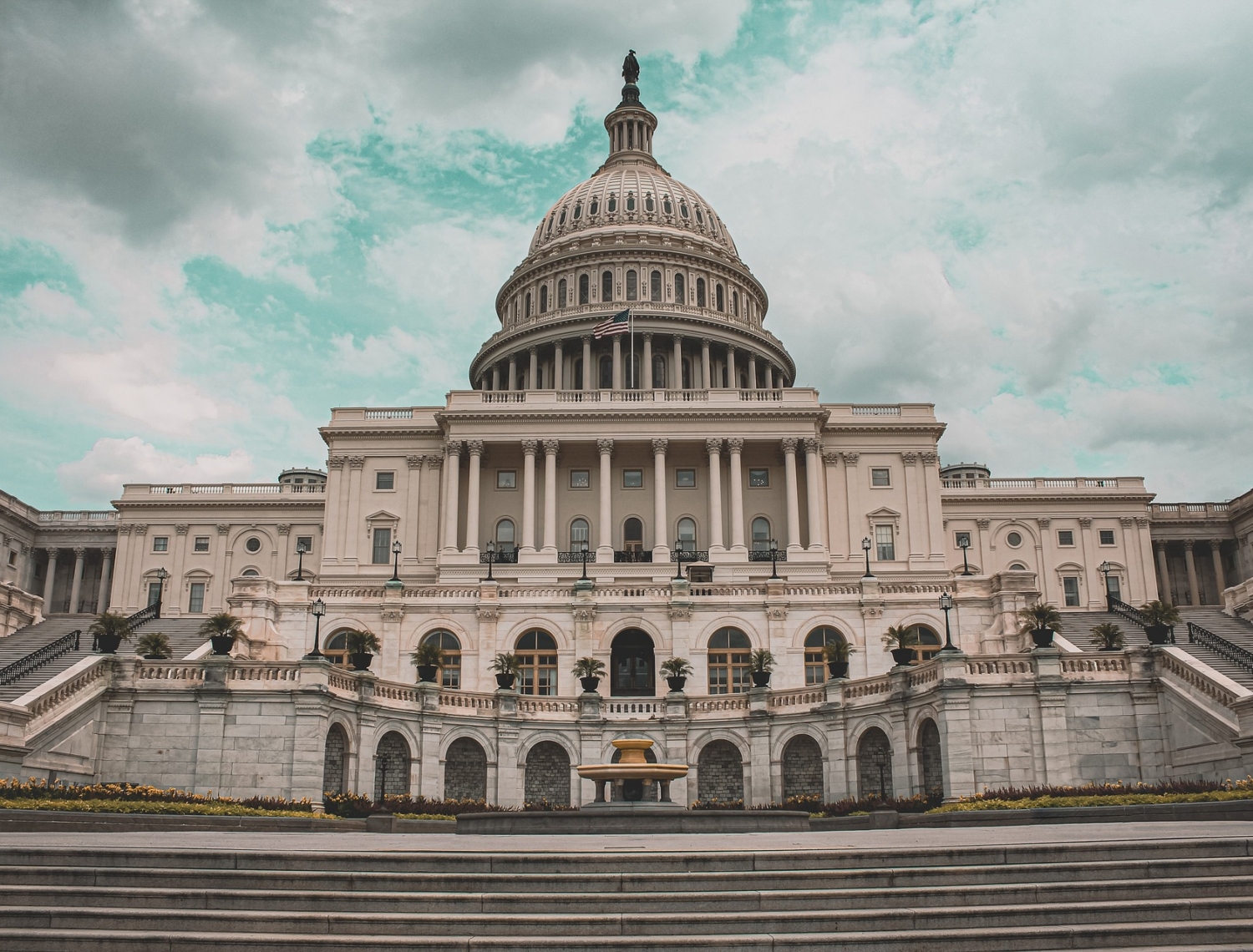This week on the Product Deepdive: Chief Growth and Product Officer Amelia Coomber demonstrates how Podscribe tracks and transcribes around 10,000 podcasts for high-level metrics. From a podcast's top advertisers to timestamps on a given episode's ad reads. Tune in now!
Before we get started, some housekeeping: clean your office. Also, starting today, the weekly Sounds Profitable newsletter is moving to Wednesday, which lets our team properly observe our numerous Monday holidays (like Juneteenth) and enjoy their weekends without being harangued about newsletter drafts. Sound good? OK – on with the show.
Last week, Spotify ended its relationship with Meghan and Harry, prompting another one of Spotify’s hosts, Ringer head Bill Simmons, to call the Sussexes “grifters” and a few other uncomplimentary things:
“What does he do? It’s one of those things where it’s like, what’s your talent? Why are we listening to you? So you were born in a royal family and then you left … You live in f**king Montecito and you just like, you sell documentaries and podcasts and nobody cares what you have to say about anything unless you talk about the royal family and you just complain about them.”
Ironically, Bill Simmons is not only the head of The Ringer, but also Spotify’s head of “podcast innovation.” Anyway, of all the things the press and pundits have had to say about this venture, I do think Bill hit it on the head by asking “what’s your talent?” What does this high profile failure, and indeed, the failures of some other celebrity podcasts, have to say about putting famous people behind the mic? What can past performance tell us about the success of such efforts in the future?
We need to make a grand detour before I can get there.
First. I want to revisit a topic I looked at several weeks ago that sparked a little debate. In “How To Murder A Podcast,” last April, I took a look at some data from Edison Research that was characterized as the “batting average” of popular podcasts by genre. My issue wasn’t with the veracity of the data – I am fairly confident that a higher percentage of True Crime podcasts make it to the top of the charts than, say, religion podcasts. My issue, as I hope was clear at the time, was in the interpretation and characterization of these results, and my concern that they would just lead to a glut of more True Crime shows rather than the content innovation podcasting so desperately needs.
And need it, we do, my friends. A couple of weeks ago, my friend Dan Misener and I shared the stage at Radiodays North America in Toronto to dish out “the truth about podcasting,” and certainly one of those truths is a growing tension about content. People who are longtime fans of the medium are always looking for new podcasts, and there are plenty in the hopper. That’s not the issue. The problem exists for the people who just finished Serial and are looking for the next Serial. Serial was nearly ten years ago.
I think about this when I see charts like the one published by Pew last week:
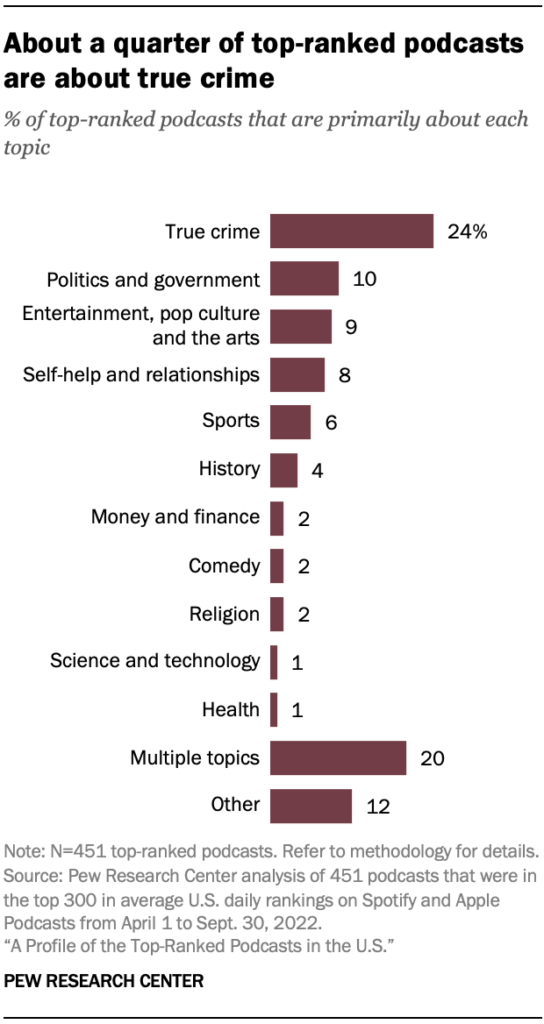
At first blush, this would appear to support the notion that producing a True Crime podcast gives you the best chance to succeed. But I ask you to take a more critical look at this chart. The number one most-listened to genre of podcast in Edison Podcast Metrics, quarter after quarter, is Comedy; yet, in Pew’s analysis of the top 451 podcasts in the Apple/Spotify charts, True Crime is 12x more likely to be listed in the top charts than Comedy.
Does that mean that True Crime is inherently more “popular” than Comedy? Or does it merely mean that the popularity of True Crime is spread out over fewer great podcasts than the popularity of Comedy? The latter is demonstrably true. Depending on which source you consult, there are 10 to 20 times more comedy podcasts than True Crime shows. True Crime has a handful of obvious “gateway” podcasts, and then a comparatively small number of shows of similar quality.
The question I always ask myself when I look at data like this is the following: does the system dictate the inventory, or does the inventory dictate the system? With podcasting still not a weekly habit for two-thirds of Americans, I think it is dangerous to look at the inventory (the current top charts) and derive a system (Sports podcasts are more likely to succeed than Music podcasts). It’s that kind of inductive reasoning that can stifle potential content innovation.
We don’t need more True Crime podcasts. We need more Serials in other genres.
You can look at charts like the Pew analysis and tell yourself that the key to growing podcasting is to make the next Serial, or (as I choose to do) you can look at this chart and realize that we haven’t made the Serial of education, or the Serial of science and technology. We haven’t made a better broad concept gateway podcast to Comedy than the polarizing Joe Rogan Experience. We haven’t made the must-listen personal finance podcast for Gen Z. And we haven’t even scratched the surface of what should be in the top five, music.
Similarly, it would be dangerous to make assumptions about future celebrity podcasts based upon the performance of past efforts. There have certainly been some high-profile stabs. Some, like Smartless, have been successful. Others, like Spotify’s recent lark with the Sussexes, not so much. I think it’s tempting to look at the latter as a failure of the “celebrity podcast.” Yet, Smartless is every bit as celebrity-driven as Archetypes was. The problem with Archetypes wasn’t a celebrity problem, it was a content innovation problem. It was just another interview show. There is no evidence that Meghan Markle is good at interviewing.
I am not of the opinion that celebrities are ruining podcasting – that is an “inventory dictates the system” conclusion based on insufficient examples. I am of the opinion that there is nothing about being a celebrity that makes you a good interviewer. Dax Shepard is a great interviewer. Drew Barrymore is fantastic! But for every Dax and Drew there are ten more celebrities attempting the interview game that are just not up to snuff.
I think we need more celebrities in podcasting. I think having celebrities from popular movies and tv shows doing podcasts is one of the best ways that we can attract non-listeners to the medium. It works, and we know it works! But we need to have those celebrities do more than interview shows. We need to lean on their familiarity as a foundation to take risks, not do the same old talk show.
I know I have talked before in this space about my days as a rhetoric instructor at Penn State years ago, and the foundational concept of the Known-New Contract. If you start your listener, reader, or viewer on known, familiar ground, you provide a safe foundation to introduce something new that they will be more receptive to. With a celebrity or known commodity as a host, a podcast can do all sorts of wild things and the audience will give it a shot.
TV already does a great job with this – it’s why so many of us watched Stanley Tucci do a cooking show. My family recently powered through Parks and Recreation for the first time, and when it ended we experienced a genuine sadness at the loss of Leslie Knope, Ron Swanson, and the other characters with whom we fell in love over these past months. Do people want an audio version of the show? I doubt it – it would be a pale imitation. And an interview show with Nick Offerman might work, but it would also be more celebrities interviewing celebrities – not exactly going to set the world on fire. But Amy Poehler and Nick Offerman did get the two pre-teen boys in our family who have NO interest in crafting to watch three seasons of Making It, which is the very epitome of the Known-New Contract. I doubt I could get them to listen to the “Ben Schwarz Show,” if it existed, but Schwarz’s character Jean-Ralphio? I think they would listen to a relationship advice show with Jean-Ralphio religiously.
I think it’s so important for us to understand that podcasting is far from a mature medium, and that what got us here is not going to get us to the next 100 million listeners. We can’t look at the existing inventory and derive a system of rules for the game – not yet. This is a medium that I believe is still capable of taking big swings at a vast blue ocean of people that haven’t made podcasts a part of their life. I don’t think the Sussexes were particularly successful at that, but it would be wrong to throw out the concept of celebrity podcasts simply because a few high profile examples didn’t actually produce good shows. Instead, let’s find ways to take known commodities and create new worlds with them.
The failure, then, is not the “celebrity podcast.” It’s the lack of innovative celebrity podcasts. Here’s why I wanted to revisit this. Next week, Sounds Profitable will release our latest quarterly research study, The Podcast Opportunity: Buyer Perceptions of Podcast Advertising. You can watch the recorded webinar and download the study here – I am really excited about this one. I can guarantee you that one of the key findings is indeed going to revolve around the tension between buyers wanting new shows and exciting new ideas, with their reluctance to take risks on unfamiliar shows in a period of economic uncertainty. How do we create exciting new forms of podcast content when the “safe money” continues to flow to a comparatively small number of existing hits?
I think the key is that we use celebrity as a gateway, but we can’t waste the gift of a celebrity on doing the same old thing. The known gives us the opportunity to pursue the new – something exciting for both buyers AND listeners. We can learn some life lessons from the Sussexes, yes – but not about podcasting.
New Partners
Sounds Profitable exists thanks to the continued support of our amazing partners. Monthly consulting, free tickets to our quarterly events, partner-only webinars, and access to our 500+ person slack channel are all benefits of partnering Sounds Profitable.
- Digital Avenues is a full-service software agency specializing in cloud-based solutions and product development with significant experience in ad-tech platforms, workflow automation, data visualization etc.
Want to learn more about partnership? Hit reply or send us an email!

